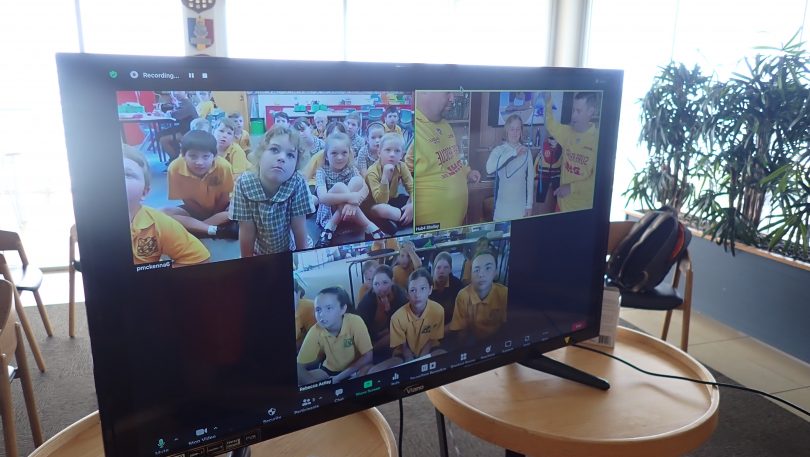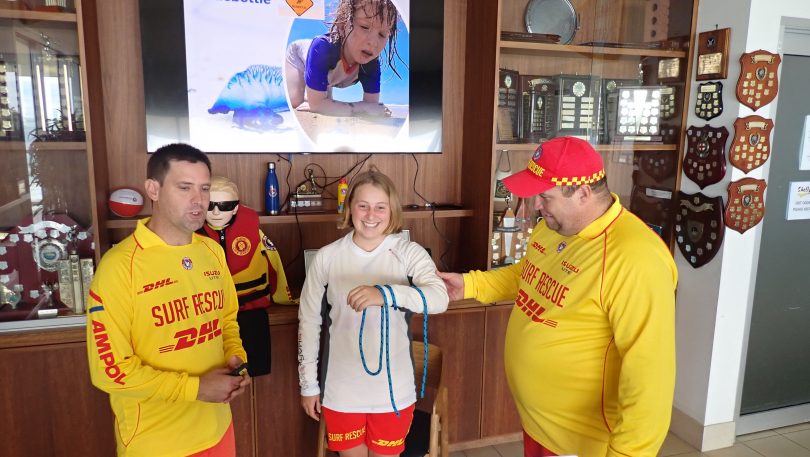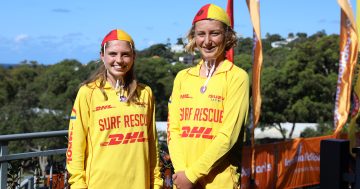
Canberra’s Sacred Heart Primary School listening to lifesavers in the Beach to Bush program. Photo: Supplied.
Many families who live inland hardly have the opportunity to go to the beach unless they are travelling for holidays, which makes it harder for them to understand the possible dangers.
It’s a problem few consider, but when inland regional families travel to the coast, how do they understand the beach rules?
Fortunately, NSW Surf Life Saving has been working with regional inland schools for 28 years with the Beach to Bush program, teaching inland students safe beach practices.
Sacred Heart Primary School in Canberra is one of 79 schools that participated in the program in 2021, however the initiative which is usually presented face-to-face every November was different this year due to the pandemic.
Online through Zoom was the delivery method this time around, but NSW Surf Life Saving still found ways to make the program interesting for schools through the creation of the ‘Big Beach Week’.
Sacred Heart Primary Year 6 teacher Katie Imbriano said she understands the importance of this program and says her students continue to get involved in it every year.
“Even though this year was different, Surf Life Saving still sent our school a box of lifesaving gear so the kids could still engage with it,” she said.
Mrs Imbriano’s class has taken part in the Beach to Bush program for many years, with the program starting for Year 4 students and running until they are in Year 6.
“They remember things they were taught in the program in Year 4,” she said. “They know how to signal for help and swim between the flags.
“It’s really good this information is being retained.”

NSW Surf Life Saving talking to Canberra’s Sacred Heart Primary kids over Zoom. Photo: Supplied.
Surf Life Saving NSW Community Education Manager, Julia Kiss, said it was important to give schools interactive activities with this year’s program, with many teachers and students becoming tired of using programs such as Zoom.
“This year because of COVID, we weren’t able to get out to schools, so we changed it up a little and ran all the sessions virtually,” Mrs Kiss said.
‘Big Beach Week’ was the result of this year’s unique virtual identity, with each day being a different lesson and activity for the students to experience.
Sessions ranged from common beach safety lessons to inland water safety and marine life knowledge.
Mrs Kiss said the lessons are not just beneficial for the students, but the entire family.
“The parents get a lot out of it too,” she said. “There are plenty of take-home resources we send the students home with and we also get the parents to continue to go through the information we give them with their children.”
The week was also live-streamed, which was far more successful than Surf Life Saving NSW anticipated.
“We ended up having about 18,000 kids around NSW participating in events,” Mrs Kiss said.
The event is run for schools who are 50km away from any beaches, with the program taking place in November in order to keep the information fresh in the students’ and parents’ minds when they travel to coastal towns in the summer holidays.
While this year was delivered virtually with 25 lifesavers giving the lectures, in a normal year, the program would be run in-person with lifesavers travelling to the schools to complete the sessions.
“It is something the students miss,” Mrs Kiss said. “A lot of the children have never been to a beach before, let alone seen a lifesaver.”
Despite this, Surf Life Saving NSW is hopeful to return to in-person sessions late next year, however the virtual element will not be entirely retired.
“Doing it virtually definitely had benefits, especially with the live streaming and being able to reach out to more students around NSW,” Mrs Kiss said.
“I think from next year, while we hope to return to in-person programs, I think we will also include virtual elements.”







